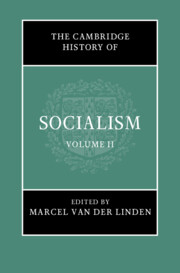Book contents
- The Cambridge History of Socialism
- The Cambridge History of Socialism
- The Cambridge History of Socialism
- Copyright page
- Contents
- Figures
- Maps
- Tables
- Contributors to Volume II
- Abbreviations
- Introduction to Volume II
- Part I Transforming State Power
- Social Democratic Routes in Europe
- Social Democratic Routes in Australia, the Americas, and Asia
- Worldwide Connections
- 12 The Second International: 1889–1914
- 13 The Second International Reconstituted: The Labour and Socialist International, 1923–1940
- 14 The Rise and Fall of the Asian Socialist Conference: 1952–1956
- 15 The Socialist International, 1951–, and the Progressive Alliance, 2013–
- 16 Municipal Socialism
- Southern Trajectories
- Left Socialisms
- Part II Transversal Perspectives
- Index
- References
16 - Municipal Socialism
from Worldwide Connections
Published online by Cambridge University Press: 03 November 2022
- The Cambridge History of Socialism
- The Cambridge History of Socialism
- The Cambridge History of Socialism
- Copyright page
- Contents
- Figures
- Maps
- Tables
- Contributors to Volume II
- Abbreviations
- Introduction to Volume II
- Part I Transforming State Power
- Social Democratic Routes in Europe
- Social Democratic Routes in Australia, the Americas, and Asia
- Worldwide Connections
- 12 The Second International: 1889–1914
- 13 The Second International Reconstituted: The Labour and Socialist International, 1923–1940
- 14 The Rise and Fall of the Asian Socialist Conference: 1952–1956
- 15 The Socialist International, 1951–, and the Progressive Alliance, 2013–
- 16 Municipal Socialism
- Southern Trajectories
- Left Socialisms
- Part II Transversal Perspectives
- Index
- References
Summary
Municipal socialism has been an unstable concept historically.1 While directly associated with the onset of the Industrial Revolution and its impact on the lives of workers in cities, its proponents drew on traditions of utopian communalism that antedated, or at least coincided with, the onset of industrialism. While it is most commonly thought of as a species of social democratic politics, municipal socialism also came to be identified with the direct seizure of power in cities, as in the Paris Commune, or more ephemerally in the political context of urban general strikes – Seattle or Winnipeg in 1919, for instance – or with the defence of Republican cities like Barcelona in the Spanish Civil War.2 The classic incarnation of municipal socialism appeared with the onset of ‘Red Vienna’ and the election of a social democratic city council and mayor in May 1919.3 Revolutionary practice of what might be thought of as ‘municipal socialism’ often consorted with anarchists’ visions of working-class self-governance.
- Type
- Chapter
- Information
- The Cambridge History of Socialism , pp. 366 - 388Publisher: Cambridge University PressPrint publication year: 2022
References
Further Reading
- 1
- Cited by

